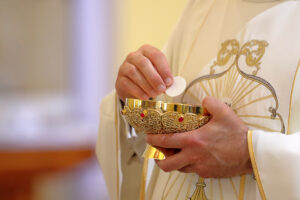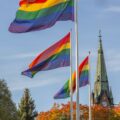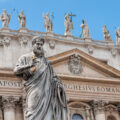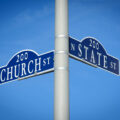What does ‘inclusion’ mean? French Christianity and its minorities
What does ‘inclusion’ mean? French Christianity and its minorities
“Can I be different and still belong?” is a question many ask, especially believers who are LGBTQ or/and have a disability. Analyst Clémence Sauty dives into inclusion policies within French Christianity. She argues they are not enough, and that it may be okay.
This article was written by Clémence Sauty and reflects her personal analyses and opinions, rather than those of EARS.
“Can I be different and still belong?” is a question clergy members hear all the time. As a training pastor and student in theology I have been faced with questions like: “Can I get a tattoo?”, “What if I need to have an abortion?” and “If I picture God as anything other than an old white man, am I still a Christian?” Religious groups, among others, are united by a set of shared expectations on behaviours. Becoming at risk of being excluded is common, since social norms set the limits of acceptability.
Minorities are people who are systematically excluded from the norm. Because of who they are, they cannot behave according to the usual expectations. Yet they keep trying to belong in the larger community and refuse to be labeled ‘outsiders’.[1] On that note, civil rights activist and writer of Sister Outsider, Audre Lorde, said that, “It is not our differences that divide us, it is our inability to recognize, accept, and celebrate those differences.”[2]
Unsurprisingly, not every minority is recognised, accepted, and celebrated. Unexpectedly, however, the groups that are targeted to be ‘included’ differ. Within French Christianity, who is currently welcome to be different?
A minority for each church
‘Inclusion’ is a word that Christian churches have helped normalise.[3] But different churches use it in different contexts.
On the one hand, some denominations focus on integrating LGBTQ+ people. Jean Vilbas, Protestant theologian, defines inclusivity as “categorical refusal of any exclusion, and the unconditional welcoming of diversity.” While the term refers to all sorts of heterogeneity (in cultures, ethnicities…), he deliberately uses it to address queerness in the church.[4] On the other hand, other denominations prefer a definition that focuses on integrating people with disabilities. The Catholic Church typically advocates for the inclusion of people with variant mental and physical capabilities, especially children with little learning and socialising skills.[5]
A quick online research in the French news suffices to confirm that different churches have chosen to reach towards different minorities. Combining the keywords ‘Catholique’ and ‘Inclusion’ results in four full web pages about inclusivity of disabled children in the private education system.[6] After that, more articles about an inclusive school environment are interspersed with articles about including women in liturgy (for instance mentioning ‘brothers and sisters’ instead of ‘brothers’ in prayers[7]) and articles about ‘the family’ being the ultimate model for inclusion.[8] On the contrary, combining the keywords ‘Protestant’ and ‘Inclusion’ results in articles like: “How Christian theology launched gender-inclusive language,”[9] “Ten Protestant theologians believe in a church that accepts sexual minorities,”[10] and the blog “L’Accueil Radical” that shares ressources for welcoming queer people in the church.[11]
A church for each minority?
I find this semantic disagreement generates two major conflicts. First of all, if some minorities are included, are all others definitively excluded? Second of all, should the struggle for imposing one’s definition of inclusion impact those concerned and set them in competition with each other?
As churches tend to include minorities, new religious definitions of ‘normalcy’ emerge. As a consequence, the boundaries of Christian communities evolve. Those who are not directly targeted by the change often express frustration. The insufficiency of inclusive policies is indeed virtually infinite: if a church makes space for women, should it not also make space for non-binary and intersex people? If a church welcomes children with disabilities, should it not also welcome all kinds of families?
With this being said, concentrating efforts towards a specific group does not prevent awareness of other groups. For example, while French Protestantism directs its inclusive efforts towards LGBTQ+ people, it also designs spaces for people with disabilities[12] and provides theological support for letting them interpret religious texts through their own experience.[13] Catholic theologian Talitha Cooreman-Guittin concludes that “most theologians who recognise that they are theologians of disability stem from the Reformation. One cannot exclude that their positive approach to deficiency is linked to the theology of grace that reaches every human, independently of their qualities, merits or actions.”[14]
Conversely, people who are not invited still attend church activities. A 2008 survey among French homosexual Catholics who went to Mass showed that 46% of them did not know whether their community was accepting or hostile towards queerness. Further, around 70% of them volunteered in their church, which is remarkably more than the 25% of straight Catholics who went to mass and did volunteer work.[15]
Inclusion is a work in progress
The way religious authorities define inclusivity does not definitively exclude unattended groups. Blind spots remain, like the inclusion of non-white people of faith. Nevertheless, it forces Christian leaders and theologians to reflect on what they cannot understand. Fitting the social norm, they “risk forgetting that the ‘excluded’ will not necessarily want or be able to live the same life as their own.”[16]
In my experience, this socratic wisdom[17] is at the core of inclusion. Inclusive policies are built on the recognition that, in practice, not ‘everybody is welcome’; whether it is because there is no ramp for disabled visitors to access the church, or because homophobic discourse is tolerated within the community, or because there lacks a place for parents to take care of children during services, or because preachings are excessively intellectual for some in the audience, or because racial biases remain untackled.
Inclusion is a work in progress. Therefore, I personally do not worry about it being constantly insufficient: successful inclusion is never enough. This is why I believe it is a great mistake to put minorities in competition with each other for a sense of belonging. Besides, I have noted that people with disabilities tend to address ‘LGBTQ+ inclusive churches’ saying that they felt they might be safer there than elsewhere. This would tend to show that people from minority groups do not feel inclusion of others excludes them even more.
Ultimately the question of “who is welcome in Christian churches” is not really up-to-date anymore. Norms vary so much that it is possible for minorities to claim their place in religion. More relevant remains the question of “where is difference recognised, accepted, and celebrated?”
This article was written by Clémence Sauty and reflects her personal analyses and opinions, rather than those of EARS.
Interested in similar topics? Go to our Dashboard and receive free updates.
[1] Howard Becker, Outsiders : Studies in the Sociology of Deviance, Free Press of Glencoe, 1963
[2] Dear Sister Outsider by Lavelle Porter
[3] Jean Vilbas, Le mouvement chrétien inclusif et sa théologie de l’hospitalité, Thèse de doctorat à l’Université de Strasbourg, 2011
[4] Jean Vilbas, Le mouvement chrétien inclusif et sa théologie de l’hospitalité, Thèse de doctorat à l’Université de Strasbourg, 2011
[5] Handicap et religion : nouveaux horizons pour la recherche ?
[6] L’école inclusive, un pléonasme ! – Enseignement Catholique
[7] Catholicisme : l’écriture inclusive fait son entrée dans les prières de la messe
[8] À l’ONU, Mgr Caccia dénonce les inégalités d’accès aux technologies numériques dans le monde, accentuées par la pandémie
[9] Article réservé à nos abonnés Comment la théologie chrétienne a lancé l’écriture inclusive
[10] Dix théologiens protestants croient à une Eglise qui accepte toutes les minorités sexuelles
[11] Research made on Google, the 16th of March 2021
[13] Talitha Cooreman-Guittin, Catéchèse et théologies du handicap : ouvrir des chemins d’amitié au-delà des barrières de la déficience, 2020
[14] Talitha Cooreman-Guittin, Catéchèse et théologies du handicap : ouvrir des chemins d’amitié au-delà des barrières de la déficience, 2020, p206
[15] Être chrétien et homosexuel en France
[16] Les revers de la société inclusive. Pour une logique de la non-exclusion | editorial | Espace éthique/Ile-de-France






